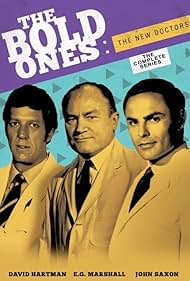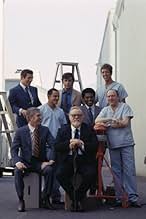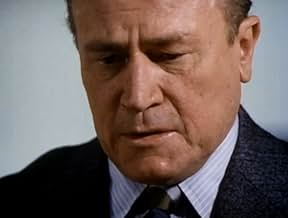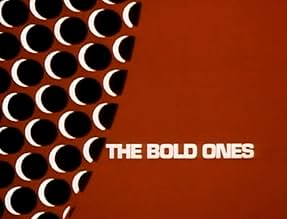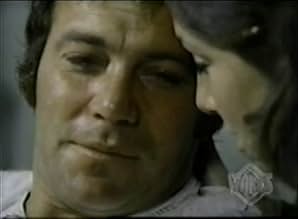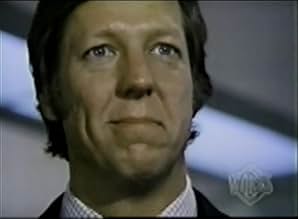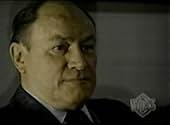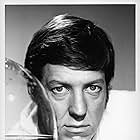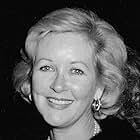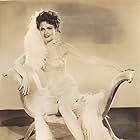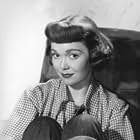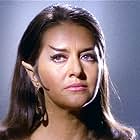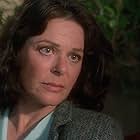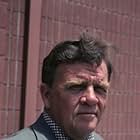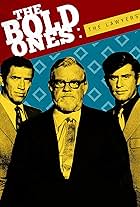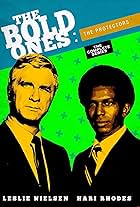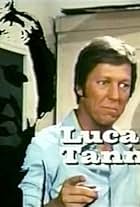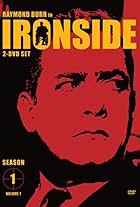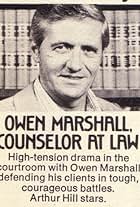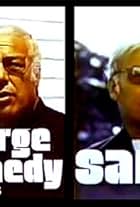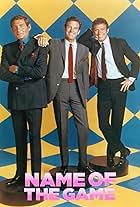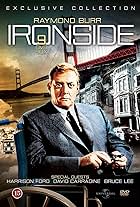VALUTAZIONE IMDb
6,9/10
170
LA TUA VALUTAZIONE
Aggiungi una trama nella tua linguaThe cases of well-respected neurosurgeon Dr. David Craig and his two young charges.The cases of well-respected neurosurgeon Dr. David Craig and his two young charges.The cases of well-respected neurosurgeon Dr. David Craig and his two young charges.
- Premi
- 2 candidature
Sfoglia gli episodi
Trama
Lo sapevi?
- QuizThe series was one of four rotating elements under the "Bold Ones" umbrella. However, by the time the series went off the air in 1973, it was the only element of the original four series that was still on the air.
- Curiosità sui creditiEnd credits disclaimer: The story, techniques and equipment shown are based on actual developments at the frontiers of medicine.
- ConnessioniReferenced in Arcibaldo: Archie Gives Blood (1971)
Recensione in evidenza
E.G. Marshall (so fine in "The Defenders" and "12 Angry Men") is David Craig, a brilliant neurosurgeon. Craig is head of the Craig Institue, a cutting edge medical research hospital. Joseph Cotten was originally considered for the role of Dr. Craig.
John Saxon is Ted Stuart, chief of surgery. Saxon was my favorite of the three heroes. I was disappointed when Saxon was fired after the third season. If it had been up to me, I might have had the great David Craig die and Saxon become head of the Craig Institute.
Saxon was an interesting looking guy and a very good actor. He had a great body and seemed very agile and athletic. Saxon brought a real sense of commitment to his performances. I wish he had done another series after leaving "The Bold Ones". Saxon did make a pilot movie for Gene Roddenberry called "Planet Earth" two years later. I think Steven Bochco considered Saxon for the role of Frank Furillo on "Hill Street Blues". Quentin Tarentino considered Saxon for the Robert Forster role in "Jackie Brown". Tarentino later directed Saxon in a "CSI" episode. Saxon is still a working actor.
David Hartman is Paul Hunter, chief of internal medicine. Hartman was a graduate of Duke and was a former Air Force officer. Hartman was probably smart enough to really have been a doctor. Hartman didn't look like everyone else on television, which was a plus.
Joel Rogosin was the primary producer of the series for its first two seasons. Rogosin left to produce "Longstreet", with James Franciscus as a blind detective.
Herbert Hirschman was brought in as "executive producer" for the third season although no one was given the title of "producer". Hirschman was a talented guy who produced episodes of "Playhouse 90", "Hong Kong" with Rod Taylor, "Perry Mason", "Dr. Kildare", "Twilight Zone" and the Herbert Brodkin series "Espionage".
Brilliant young David Levinson was brought in to produce the fourth season. Levinson had done a magnificent job of producing "The Senator" with Hal Holbrook. Most recently Levinson had produced "Sarge" with George Kennedy as a priest/detective. The next season Levinson would produce "A Case of Rape", an excellent TV movie with Elizabeth Montgomery.
Levinson made a good series near great.
To replace John Saxon, Levinson brought in Robert Walden as young Dr. Marty Cohen. Cohen still has a lot to learn. I can't remember any other drama series hero with a Jewish name. A quietly ground-breaking move. You have to guess Universal would have preferred a Jan-Michael Vincent type to Walden.
David Hartman became the primary focus of the series for the fourth season even though E.G. Marshall still got top billing. Robert Walden got "also starring" billing. Hartman was nominated for a Golden Globe for the fourth season. The other nominees: Peter Falk (winner), Robert Young, Chad Everett, William Conrad, and Mike Connors.
Hartman insisted Robert Walden's picture be taken down in the Universal commissary because Walden wasn't a "star" of the series. Hartman later let into Joan Lunden on "Good Morning America" when in the closing of a show she said goodbye after Hartman. Hartman insisted he say the last goodbye. Apparently Hartman was protective of his hard-won prerogatives. Or perhaps he was a little insecure despite his big education and big brain.
David Levinson's favorite directors were John Badham, Richard Donner, and Daryl Duke. In the fourth season Badham and Donner each directed three episodes and Duke did two.
In one episode you hear the hospital public address system "paging Dr. Sackheim". This was a shout-out to the great writer-producer William Sackheim ("The Law"), who was a mentor to both John Badham and David Levinson.
Some of Levinson's compelling fourth season episodes:
Donna Mills is a nurse at the hospital who is a friend of Marty Cohen. Mills is in a lesbian relationship with a woman who is a clinical psychologist. Cohen is disturbed at the relationship and believes Mills is basically heterosexual. Cohen convinces Mills to have sex with him. The sex is not that good for Mills. Cohen tells Mills that the earth doesn't always move. Mills finally leaves the hospital and also leaves both Cohen and the clinical psychologist. Written by Peggy O'Shea and directed by Jeremy Kagan.
Ross Martin is a high school teacher who is suffering psychotic episodes. Milton Berle plays a psychiatrist at the Craig Institute who is treating Martin. Berle is a close friend of David Craig, but the two doctors strongly disagree on the most effective treatment. Berle wants to focus on talk therapy while Craig insists on surgery and pharmaceuticals. Craig prevails and Martin becomes more docile and perhaps better. Berle quits in protest. Berle says Craig will cry just like he did when Ted Stuart left, but he will get over it. Written by story editor Lionel E. Siegel. Directed by Marvin Chomsky.
Susan Clark is a young woman paralyzed from the neck down in a boating accident. She wants to end her life. Robert Foxworth is her husband. Dr. Craig wants the woman to continue living. She asks why. Craig says she can see the events of her time unfold. Craig is devastated when the woman chooses to die. Written by Robert Van Scoyck and Gustave Field. Directed by Walter Doniger.
Sheila Larken ("Storefront Lawyers") is carrying a baby in her womb that was conceived by her sister Stephanie Powers and Stephanie's husband Carl Betz.
Frank Converse is in fine form as a young man in his prime who is suffering from sexual impotence. Shirley Knight is his wife.
Richard Basehart is a doctor suspected of doing unnecessary operations. Dorothy Malone is his wife.
Carl Reiner is excellent as a maverick doctor back from China who is an unpopular advocate of acupuncture. Written by Robert Collins. Directed by John Badham.
John Saxon is Ted Stuart, chief of surgery. Saxon was my favorite of the three heroes. I was disappointed when Saxon was fired after the third season. If it had been up to me, I might have had the great David Craig die and Saxon become head of the Craig Institute.
Saxon was an interesting looking guy and a very good actor. He had a great body and seemed very agile and athletic. Saxon brought a real sense of commitment to his performances. I wish he had done another series after leaving "The Bold Ones". Saxon did make a pilot movie for Gene Roddenberry called "Planet Earth" two years later. I think Steven Bochco considered Saxon for the role of Frank Furillo on "Hill Street Blues". Quentin Tarentino considered Saxon for the Robert Forster role in "Jackie Brown". Tarentino later directed Saxon in a "CSI" episode. Saxon is still a working actor.
David Hartman is Paul Hunter, chief of internal medicine. Hartman was a graduate of Duke and was a former Air Force officer. Hartman was probably smart enough to really have been a doctor. Hartman didn't look like everyone else on television, which was a plus.
Joel Rogosin was the primary producer of the series for its first two seasons. Rogosin left to produce "Longstreet", with James Franciscus as a blind detective.
Herbert Hirschman was brought in as "executive producer" for the third season although no one was given the title of "producer". Hirschman was a talented guy who produced episodes of "Playhouse 90", "Hong Kong" with Rod Taylor, "Perry Mason", "Dr. Kildare", "Twilight Zone" and the Herbert Brodkin series "Espionage".
Brilliant young David Levinson was brought in to produce the fourth season. Levinson had done a magnificent job of producing "The Senator" with Hal Holbrook. Most recently Levinson had produced "Sarge" with George Kennedy as a priest/detective. The next season Levinson would produce "A Case of Rape", an excellent TV movie with Elizabeth Montgomery.
Levinson made a good series near great.
To replace John Saxon, Levinson brought in Robert Walden as young Dr. Marty Cohen. Cohen still has a lot to learn. I can't remember any other drama series hero with a Jewish name. A quietly ground-breaking move. You have to guess Universal would have preferred a Jan-Michael Vincent type to Walden.
David Hartman became the primary focus of the series for the fourth season even though E.G. Marshall still got top billing. Robert Walden got "also starring" billing. Hartman was nominated for a Golden Globe for the fourth season. The other nominees: Peter Falk (winner), Robert Young, Chad Everett, William Conrad, and Mike Connors.
Hartman insisted Robert Walden's picture be taken down in the Universal commissary because Walden wasn't a "star" of the series. Hartman later let into Joan Lunden on "Good Morning America" when in the closing of a show she said goodbye after Hartman. Hartman insisted he say the last goodbye. Apparently Hartman was protective of his hard-won prerogatives. Or perhaps he was a little insecure despite his big education and big brain.
David Levinson's favorite directors were John Badham, Richard Donner, and Daryl Duke. In the fourth season Badham and Donner each directed three episodes and Duke did two.
In one episode you hear the hospital public address system "paging Dr. Sackheim". This was a shout-out to the great writer-producer William Sackheim ("The Law"), who was a mentor to both John Badham and David Levinson.
Some of Levinson's compelling fourth season episodes:
Donna Mills is a nurse at the hospital who is a friend of Marty Cohen. Mills is in a lesbian relationship with a woman who is a clinical psychologist. Cohen is disturbed at the relationship and believes Mills is basically heterosexual. Cohen convinces Mills to have sex with him. The sex is not that good for Mills. Cohen tells Mills that the earth doesn't always move. Mills finally leaves the hospital and also leaves both Cohen and the clinical psychologist. Written by Peggy O'Shea and directed by Jeremy Kagan.
Ross Martin is a high school teacher who is suffering psychotic episodes. Milton Berle plays a psychiatrist at the Craig Institute who is treating Martin. Berle is a close friend of David Craig, but the two doctors strongly disagree on the most effective treatment. Berle wants to focus on talk therapy while Craig insists on surgery and pharmaceuticals. Craig prevails and Martin becomes more docile and perhaps better. Berle quits in protest. Berle says Craig will cry just like he did when Ted Stuart left, but he will get over it. Written by story editor Lionel E. Siegel. Directed by Marvin Chomsky.
Susan Clark is a young woman paralyzed from the neck down in a boating accident. She wants to end her life. Robert Foxworth is her husband. Dr. Craig wants the woman to continue living. She asks why. Craig says she can see the events of her time unfold. Craig is devastated when the woman chooses to die. Written by Robert Van Scoyck and Gustave Field. Directed by Walter Doniger.
Sheila Larken ("Storefront Lawyers") is carrying a baby in her womb that was conceived by her sister Stephanie Powers and Stephanie's husband Carl Betz.
Frank Converse is in fine form as a young man in his prime who is suffering from sexual impotence. Shirley Knight is his wife.
Richard Basehart is a doctor suspected of doing unnecessary operations. Dorothy Malone is his wife.
Carl Reiner is excellent as a maverick doctor back from China who is an unpopular advocate of acupuncture. Written by Robert Collins. Directed by John Badham.
- Cheyenne-Bodie
- 22 ott 2011
- Permalink
I più visti
Accedi per valutare e creare un elenco di titoli salvati per ottenere consigli personalizzati
- How many seasons does The Bold Ones: The New Doctors have?Powered by Alexa
Dettagli
- Data di uscita
- Paese di origine
- Lingua
- Celebre anche come
- The Bold Ones: The New Doctors
- Luoghi delle riprese
- Aziende produttrici
- Vedi altri crediti dell’azienda su IMDbPro
- Tempo di esecuzione1 ora
- Mix di suoni
- Proporzioni
- 1.33 : 1
Contribuisci a questa pagina
Suggerisci una modifica o aggiungi i contenuti mancanti

Divario superiore
By what name was I nuovi medici (1969) officially released in India in English?
Rispondi